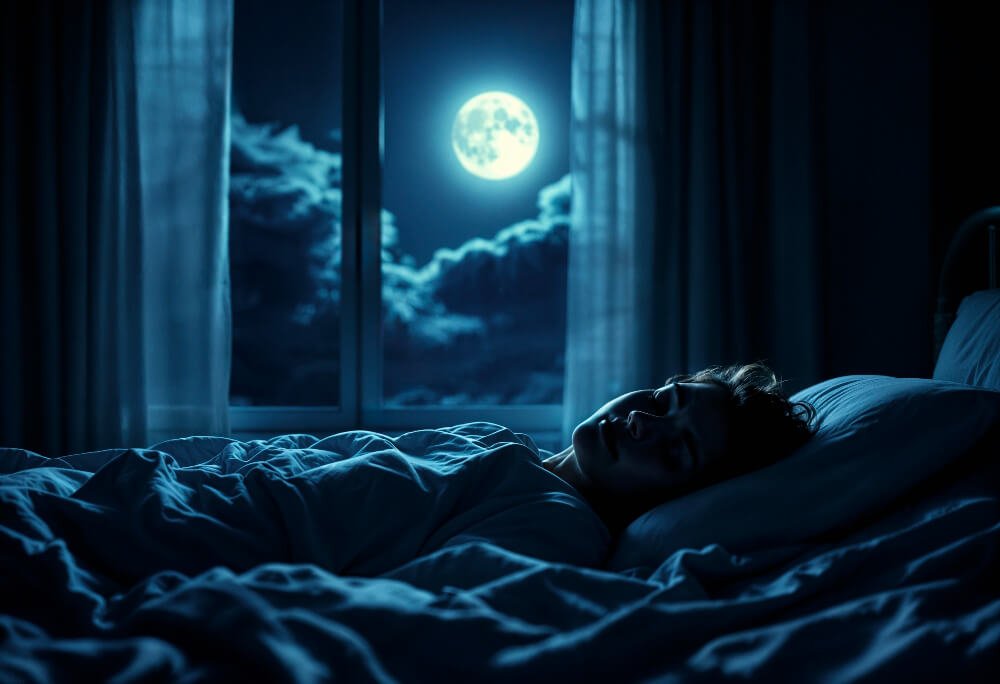Have you ever noticed that after pulling an all-nighter or experiencing a few restless nights, your dreams become more intense, vivid, or downright strange? There’s a scientific reason behind this! Sleep deprivation messes with your brain’s sleep cycles, causing a phenomenon known as REM rebound—a state where your body compensates for lost REM sleep by making your dreams more frequent, intense, and sometimes surreal.
But why does this happen? And what can you do to prevent these unsettling dream experiences? Let’s dive into the fascinating world of dreams and uncover how lack of sleep alters your subconscious adventures.
Table of Contents
Understanding REM Sleep and Dream Formation
What Happens During REM Sleep?
Sleep occurs in cycles, alternating between non-REM and REM (Rapid Eye Movement) sleep. REM sleep is the stage where:
- The brain is highly active, similar to wakefulness.
- The body is in a state of temporary paralysis to prevent movement.
- Most dreaming takes place, with vivid imagery and story-like sequences.
During REM sleep, the brain processes emotions, consolidates memories, and stimulates creativity. However, when sleep deprivation disrupts this cycle, your brain compensates in unusual ways.
This New Sleep Discovery Stops Snoring by Targeting a Single Nerve – Order Now!
How Sleep Deprivation Triggers REM Rebound
When you don’t get enough sleep, your body prioritizes deep sleep to restore physical functions, delaying REM sleep. But as soon as you catch up on rest, your body overcompensates by entering REM sleep more quickly and for longer periods. This results in dreams that feel extra vivid, bizarre, or even unsettling.
The Effects of Sleep Deprivation on Dreams

More Intense and Emotional Dreams
Have you ever woken up feeling like your dreams were way too real? That’s because REM rebound causes the brain to process information more chaotically, often amplifying emotions like anxiety, excitement, or fear. This can lead to:
- Highly detailed and lifelike dreamscapes
- Strong emotional reactions upon waking
- More frequent nightmares or unsettling themes
Fragmented and Disorganized Dream Sequences
Since sleep-deprived REM is more intense but rushed, dreams can feel choppy, bizarre, or nonsensical. You might experience:
- Sudden scene changes that don’t follow a logical story
- A mix of real and imagined experiences
- Unusual characters or surreal elements
The Sleep Trick That Clears Your Airway and Silences Snoring – Discover It Here!
Increased Likelihood of Lucid Dreaming
Interestingly, some people report experiencing lucid dreams—where they are aware they are dreaming and can sometimes control the dream. The intensified brain activity during REM rebound can lead to heightened self-awareness in dreams.
Why Do Dreams Get Weirder With Sleep Deprivation?
Disrupted Sleep Patterns Lead to Unstable Dreaming
Irregular sleep schedules, stress, and sleep disorders contribute to erratic REM sleep cycles, leading to dreams that:
- Feel unstructured or disjointed
- Contain unexpected or unsettling themes
- Feature exaggerated emotions
Increased Brain Activity Enhances Surreal Elements
During REM sleep, the brain’s prefrontal cortex (which controls logic and reasoning) is less active, while the amygdala (linked to emotions) is highly active. This imbalance can cause dreams to be:
- More emotionally charged
- Less rational and more surreal
- Difficult to distinguish from reality
Emotional Processing Becomes Accelerated
Dreams help process daily experiences, but when sleep is insufficient, the brain tries to catch up quickly, leading to heightened emotional intensity. This can cause:
- More frequent nightmares
- Recurring themes linked to stress or trauma
- Strange or exaggerated dream scenarios
A Peaceful Night Is One Nerve Away—You Won’t Believe This Discovery! Get It Today!
How to Manage Intense Dreams from Sleep Deprivation
Prioritize Sleep Hygiene
Good sleep habits can help stabilize your sleep cycles and reduce the effects of REM rebound. Try:
- Maintaining a consistent sleep schedule (even on weekends)
- Creating a relaxing bedtime routine (like reading or meditation)
- Avoiding screens and caffeine before bed
Reduce Stress Levels
Since stress is a major contributor to disturbing or intense dreams, managing daily stress can help regulate your dream experiences. Techniques include:
- Practicing mindfulness or meditation
- Engaging in regular physical activity
- Journaling before bed to process emotions
Seek Professional Guidance if Needed
If your vivid dreams become disruptive or distressing, consider speaking with a healthcare professional. Chronic sleep deprivation or recurring nightmares could be linked to underlying health issues like:
- Sleep disorders (e.g., insomnia, sleep apnea)
- Anxiety or PTSD
- Hormonal imbalances
Conclusion: Your Dreams Are a Reflection of Your Sleep Health
The connection between sleep deprivation and vivid, unusual dreams is undeniable. When your body is deprived of sleep, it fights back with intensified REM cycles, heightened emotions, and surreal dreamscapes.
While this may be an interesting phenomenon, it’s also a sign that your body needs better sleep hygiene.
So, if you find yourself experiencing strange, intense dreams, it might be time to reassess your sleep habits. Prioritizing rest is not just about feeling refreshed—it’s about ensuring your mind and body function at their best, both while awake and while dreaming.

